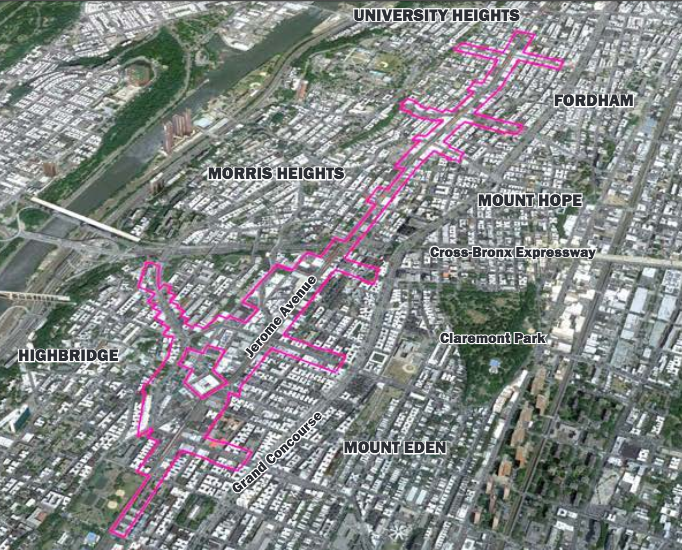
NYC DCP
The rough footprint of the recently passed Jerome Avenue rezoning.
Amid an uproar among Bronx automotive businesses, the city’s Department of Small Business Services has announced the availability of financial assistance for the auto-body shops that might be forced to relocate after the City Council passed a rezoning for the Jerome Avenue corridor last month.
The rezoning encourages residential and commercial development in a 92-block area including the Jerome Avenue corridor, most of which is currently zoned for auto-uses, and some neighborhood crossstreets. The rezoning would require a percentage of all new development to be income-targeted under the city’s mandatory inclusionary housing policy, and due to the current weakness of the market, the Department of City Planning predicts that new construction in the near term would be subsidized and likely 100-percent income-targeted.
During the rezoning debate, concerns were often voiced about the fate of the auto businesses, which supporters say provide decent, blue-collar wages. Property owners who have a chance to transform their property from accommodating low-lying auto shops to instead hosting rental buildings are likely to uproot the auto firms, and there is evidence that is already happening.
SBS Commissioner Gregg Bishop said in City Council testimony on Monday that his office has made available an estimated $1.5 million in relocation grants for the auto businesses. Also on Monday, , SBS tweeted about a mobile office on Jerome Avenue on Wednesday with resources on financing for businesses being affected by the measure.
But Pedro J. Estevez, the president of the United Auto Merchants Association, described the funding as insult to injury, “This is worse than Willets Point. Willets Point was dressed in a tuxedo. Jerome Avenue is in shorts and a T-shirt,” he said during a phone interview, referring to the city’s botched relocation plan for auto businesses displaced by a troubled development project launched near CitiField during the Bloomberg administration
Estevez said he will be testifying Wednesday morning at the City Planning Commission hearing about how small automotive businesses have already been affected by the rezoning.
According to the Department of City Planning website, rezoning measure went through a seven-month review process during which community members had the opportunity to make official comments on the proposal before it was approved by the City Council.
Clarification: The Jerome Avenue rezoning also included several small “retention zones” intended to protect some of the existing auto-repair industry.








